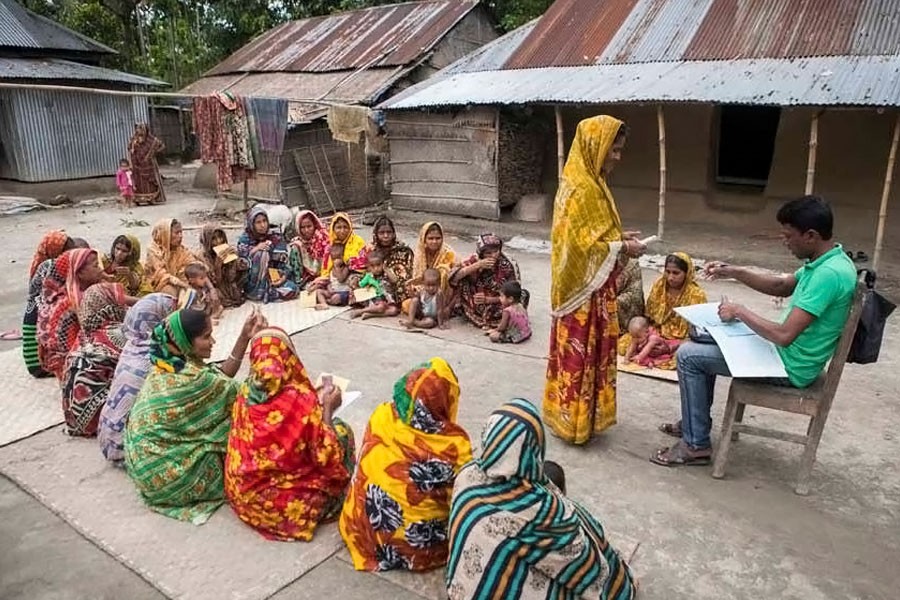
Published :
Updated :

Controversy centring around the non-government organisations (NGOs), on their mode of operation and scores of other related matters, has for long attracted public attention. As a breeding ground of NGOs since the inception of the country, Bangladesh has over the decades witnessed monumental growth of these organisations-necessitated largely by the need of a parallel force to shoulder some of the development activities in the socio-economic arena. This being the case, flourishing of these organisations as a composite civil society group was likely to be reckoned as a potentially effective partner in both public and private sector undertakings. This, unfortunately, has not happened, although there were some laudable contributions by some of the NGOs to socio-economic uplift of the poor.
The legitimacy of the NGOs as an effective parallel force is due to the perception that they are more proactive than traditional functionaries, and that being free from bureaucratic tangles they are better positioned to operate independently. But this does not say all. There are controversies on the modes of receiving funds from the donors, the spending patterns, financial transactions and so on. Besides, there are allegations that despite the positives of NGO intervention, the resources that reach the target group are far less than what actually should be. These are the grey areas that have grown unhindered in the absence of transparency and an effective overseeing authority.
The government, in the absence of an effective regulatory body to oversee the activities of the NGOs in the country, is reportedly contemplating to set up a Commission. It has been learnt that the proposal for establishing the Commission aimed at bringing all non-governmental organisations under a single authority to hold them accountable and ensure transparency in their financial transactions has already been approved by the secretary-level committee for administrative development. The purpose is to see that NGOs registered with various authorities are made accountable to a single agency for closer monitoring, and if necessary, regulating their operations in their respective fields in a coordinated manner. The Commission is also expected to deliver a draft law in this regard.
While the need for effective measures to oversee the transparency of NGO operations is beyond controversy, getting them involved with the government's development programmes should be given the priority it deserves. There are fields where the NGOs have worked well and the knowledge and expertise they have gathered through trial and error may prove crucial for execution of programmes. Also it is important that unlike most government agencies which characteristically suffer from a lack of institutional memory, the strength of the NGOs lies in their experiences from past activities in various fields with a readiness for corrective actions. Notable as they are as a parallel force, their experiences and expertise may be found rewarding to not only complement the inadequacies and connect the missing links in governmental programmes in similar fields but reinforce those with innovative ideas that they have experimented in their own programmes. On the other hand, to make their own programmes successful, the NGOs do need close liaison and coordination with the government machinery, particularly where utility services are required.
There are activities such as adult literacy, farm credit to small farmers, hygiene and sanitation, cottage industries, cooperatives for marketing poultry and dairy products and a host of other income generating and empowerment programmes where partnering with NGOs could be more sustainable than these are currently now. There are examples that show that a lack of coordination with the government seriously tells upon the sustainability of programmes run by the NGOs. Now, how best to work out a modality in this regard is crucial. The government may like to identify areas where works can be shared, and to do so, there has to be intensive dialogue with the relevant NGOs.
Partnership between the private sector and the NGOs can also be mutually beneficial. The fact that NGOs have a vast grassroots base across the country is a point that can profitably be made use of by the corporate sectors by way of teaming up in reaching out to the target groups. This can prove effective even from a typical but economically viable business consideration. Besides, sharing of experiences in running development projects to alleviate the lot of the poor can also be seen as a plausible proposition. It is heartening to learn that at present there is an increasing awareness about the positives of such partnership. The CARE Bangladesh, it has been learnt from a local daily, is currently implementing 22 projects in partnership with more than 40 NGOs and 27 private sector partners. The programmes are related to improving the livelihood patterns of marginalised women and girls and the extreme poor in rural areas.
Gieven the scope of increasing and extending NGO activities, it is in the national interest that they were better engaged and hence better utilised.
wasiahmed.bd@gmail.com


 For all latest news, follow The Financial Express Google News channel.
For all latest news, follow The Financial Express Google News channel.